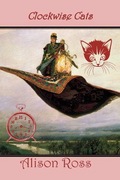FIRST LITERARY REVIEW-EAST
CLOCKWISE CATS
By Alison Ross
(Fowlpox Press, 2013)
ISBN: 978-1-927593-26-4
Reviewer: Cindy Hochman
Alison Ross, the indefatigable editor of the thought-provoking online literary journal Clockwise Cat, is one of the true contemporary heirs to the Surrealist tradition, with Beat leanings and a revolutionary spirit all her own. Ms. Ross speaks the language of the visual, flexing her muscles of the marvelous with all the pulse and thrum of “The Tell-Tale Heart.” In her aptly titled chapbook, Clockwise Cats, Ms. Ross accomplishes an impressive feat—embedding her footprints firmly alongside those of Rimbaud and Baudelaire, while avoiding the sand trap of the derivative, and retaining all of what makes the poetry of the incongruous so compelling and, well, incongruous. She is also my heroine for proving that a book consisting of only nine poems can indeed be epic.
Both in the editing of her journal and in her own fine work, this poet has always been on a mission—not only to present provocative and memorable mind-waves, which she does with fierce aplomb, but to spark a vital discourse which treads (not always so gingerly) over the turfs of both the poetical and polit tools of Dada, but gives them an updated, technological, cultural, and sociological spin.
The Anachronistic Anarchist
The anachronistic anarchist
uses post-it notes
to remind herself
of her dinner date
with the sun.
But the sun
has a cold
and sends a rain check
that bounces
into a
reverse
black
hole.
The anachronistic anarchist
sends two gmails a day
to her former self
but they are flagged as spam
and the user is blocked
from
the
future
It is clear that Ms. Ross, steeped deeply in multilateral dimensions of creativity, has fully embraced the sacred connection between poetry and art, especially as it pertains to the particular shades of the Surrealistic psyche. This is why it is wholly apropos that the ghost of Joan Miró shows up frequently within these poems; after all, Miró felt that “poetry and painting are the same.” In the poem “Miró’s scream,” Ross herself integrates the two genres with a colorful mural of words:
Miró’s scream became a new color of crayon . . .
Miró’s scream ripped open like a red yawn
and lullabies fluttered out like blue bats . . .
and oblivion unfurled like a new color of crayon.
As a serious student of the surreal, Alison Ross is aware that titles of poems matter. On the surface, the title “Death is imminent and I’m still smiling” may strike the reader as blithe, with the poet’s tongue planted flippantly in her cheek, but there is no denying that it contains that hint of haunt and juxtaposition that are integral to the genus Surrealism, and the poem itself invokes the dreamlike freefall of time and space. Thankfully, this poem also contains an “umbrella of the imagination,” since, according to the poet, “it’s raining cats and clocks.”
The grand finale of this chapbook is a poem that will be quite familiar to Ross’ fans and contributors, as it has long graced the first page of her webzine and, in fact, bears the same name as the journal itself. Here again, what may appear to be jocular (it has always reminded me of the iconic Felix the Cat pendulum clock) is, in essence, the ethos of this book: that, by eschewing the mundane, a cool cat can sometimes outwit eternity.
The clockwise cat
is wise to clocks
She knows their motive;
to tame the savage animal of time
In her brief bio, Alison Ross humbly states that she “dabbles delicately in verse.” If I were writing this bio, I would revise it to say “she reverberates resolutely with resonant roars.”
[This review originally appeared in Femmewise Cat. You can check out/download Alison's book at Fowfox Press. Click here and scroll down: http://fowlpox.tk/]
